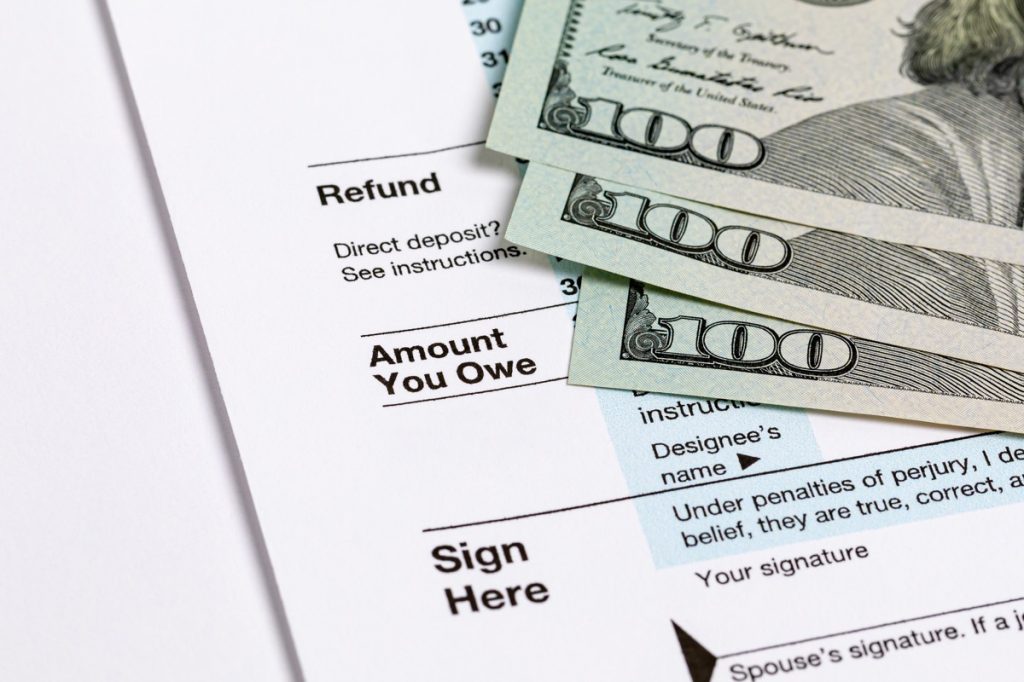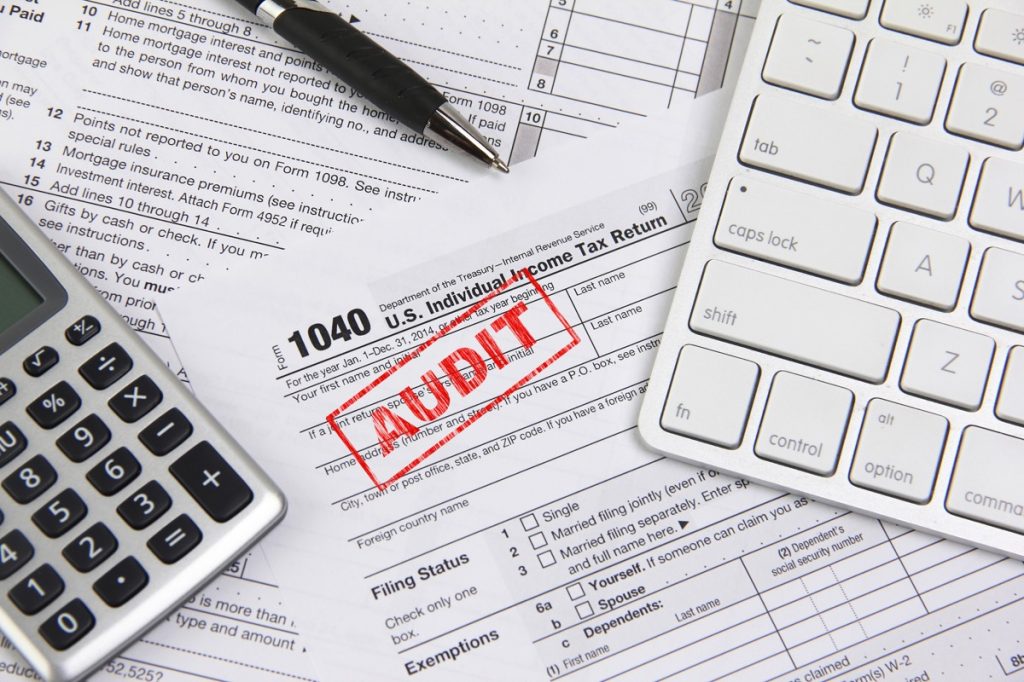6 Tax Mistakes That Could Get You Audited, According to Finance Experts

Perhaps the only thing worse than compiling your taxes each year is finding out you’re getting audited after all your hard work. Fortunately, there are plenty of services and software options that can help you avoid any potential headaches or costly fines—even if you’re under a time crunch. But if you’re looking for a better idea of how to steer clear of a run-in with the IRS, there are a few things to remember before you file. Read on for the reasons to get audited this year, according to finance experts.
RELATED: IRS Announces Major Tax Filing Changes for Next Year—Are You Affected?
6 Reasons to Get Audited for This Year’s Taxes
1. You’ve misreported your income.

Filing your taxes can be relatively straightforward if you’re dealing with a single paycheck. But if you have a complicated financial situation with multiple streams of income, you could land yourself in hot water if you’re not careful while filling out forms.
“The IRS uses a program to match up what was reported to the IRS from employers, banks, brokerage, and other sources compared to what you reported on your tax return. If there is a difference, it could open you up to an audit,” says Robert Farrington, founder and CEO of The College Investor.
“So, make sure that you’re accurately entering all your information from those W2s, 1099s, and other forms to avoid an audit. If there is an error on any of them, you need to work with whoever issued it to get it resolved,” he says.
2. Your income changed from year to year.

Whether it’s a change in employment or an unforeseen financial emergency, everyone has good and bad financial years. However, significant changes in income can also bring about more scrutiny from officials.
“If your income rises and falls each and every year, the IRS might want to know more about why it does that,” Riley Adams, founder and CEO of WealthUp, tells Best Life. “It might be because you’re claiming different credits and deductions each year, your income isn’t consistent, or perhaps something else.”
But this doesn’t necessarily mean you need to pigeonhole your earnings. “You’re not being penalized for having dynamic income, but compared to tax returns with steady taxable income year to year, it certainly makes your return stand out,” says Adams. “If it’s just part of your normal earnings and nothing out of the ordinary, you shouldn’t sweat it: Life has its ups and downs, and so does your income.”
“As always, just make sure you document everything, provide substantiated tax positions on your return, and possibly check with a professional if you’ve got any questions,” he suggests.
RELATED: 4 Warnings About Using TurboTax, According to Experts.
3. You’re being generous with deductions.

Logan Allec, a CPA and owner of tax relief company Choice Tax Relief, says he’s seen clients get audited if they’ve overstated their deductions against their income. Whether it’s an attempt to lower your tax liability or an innocent mistake, it could raise a red flag with the IRS.
“The IRS processes millions of tax returns similar to yours annually, and so it knows how much in, say, charitable contributions is a typical range for taxpayers similar to you,” Allec explains. “But if your charitable contributions amount is way beyond this range, that could trigger an audit.”
Michael Hammelburger, the CEO and a financial expert working for The Bottom Line Group, recommends keeping detailed records, receipts, and documentation for any deductions you plan on claiming. “It’s essential to be transparent and only deduct legitimate expenses,” he notes.
READ THIS NEXT: 4 Warnings About Using TurboTax, According to Experts.
4. You’re filing incorrectly for your business.

Entrepreneurs know that filing taxes for a personal business often requires an outside professional to ensure everything is handled correctly. Otherwise, it could wind up becoming grounds for further investigation.
“If you have a side gig or business, there are a lot of things that could trigger an audit,” Farrington warns. “For example, excessive deductions or depreciation that don’t make sense for your business. Or unusual losses that could indicate the business is a hobby and not a business.”
He adds, “You must realize that the IRS has millions of business returns, data points, and more to see if your business is ‘normal’ or not. So if you’re claiming items on your tax return, you need to be able to prove the expense was ordinary and necessary for the course of doing business.”
Moira Corcoran, a certified public accountant and tax expert at JustAnswer, adds that round numbers can also be a red flag for an audit: “If you write off an even $8,000 for marketing, $5,000 for legal, or $3,000 for travel, the IRS knows you are not adding legitimate deductions.”
5. You’re making a lot of money.

According to experts, earning a lot of money could put you at higher risk of a potential audit.
“If you’re pulling in a big income and think paying your fair share of taxes will be enough to keep the IRS off your back, you could be in for a surprise,” says Adams. “You may very well be right, but if you try to get cute and claim some high-income-focused tax credits and deductions but do it improperly, you can expect the IRS to knock at your door—although not literally, as they generally send you something in the mail first.”
“The IRS has more to gain by scrutinizing a high-income taxpayer than it would for someone who earns less. So, they’ll be more likely to check that you’ve dotted your i’s and crossed your t’s,” Adams explains.
“Make sure you check—and then double-check—what you’re claiming on your return before filing it. You’ll want to know you’re not improperly applying some tax positions that you think will lower your taxable income but end up causing more headaches than anticipated,” he suggests.
RELATED: 6 Tax Return Secrets From Accountants.
6. You’ve fallen victim to a scam.

Even the IRS is not immune to scams. In fact, at the beginning of the year, the agency released its 2023 Dirty Dozen campaign, an annual list of the common scams targeting taxpayers.
“There are many ways to get good tax information, including from a trusted tax professional, tax software and IRS.gov. But people should be incredibly wary about following advice being shared on social media,” IRS Commissioner Danny Werfel said in a statement at the time. “Remember, if it sounds too good to be true, it probably is,” he added.
For example, in March, the IRS had warned about two scams circulating on social media: Form 8944 fraud and Form W-2 fraud. “Both schemes encourage people to submit false, inaccurate information in hopes of getting a refund,” the agency explained.
Later that month, the agency cautioned the public about another scam in which third parties were promoting a fraudulent fuel tax credit.
“The fuel tax credit is meant for off-highway business and farming use and, as such, is not available to most taxpayers,” the agency explained in a press release. “However, unscrupulous tax return preparers and promoters are enticing taxpayers to inflate their refunds by erroneously claiming the credit.”
And in all these cases, it could end up with you being audited—or even worse. “Taxpayers who intentionally file forms with false or fraudulent information can face serious consequences, including potentially civil and criminal penalties,” the IRS said in its alert.
To avoid an audit or more serious charges, always consult the Dirty Dozen list if you have doubts.
RELATED: 5 Warnings About Using IRS Free File for Your Taxes, According to Finance Experts.
Getting audited could be no fault of your own.

No matter your situation, there may come a point where the confusing process of preparing and filing your taxes catches you off-guard. But even if you’ve managed to get everything right, you could still wind up getting contacted by the authorities.
“Remember that an audit doesn’t necessarily mean you did anything wrong,” says Farrington. “The IRS is doing an ‘audit,’ which means checking up on everything you reported.”
Moreover, the IRS randomly selects taxpayers for audits each year. “Sometimes returns are selected based solely on a statistical formula. We compare your tax return against ‘norms’ for similar returns. We develop these ‘norms’ from audits of a statistically valid random sample of returns, as part of the National Research Program the IRS conducts. The IRS uses this program to update return selection information,” the agency explains on its website.
And an audit doesn’t always end up in penalties. “I’ve seen some cases of audits go in the taxpayer’s favor, meaning the IRS actually owed a bigger refund after everything was checked,” Farrington says. “That’s why the important part is to keep accurate records and documents.”
For more financial advice delivered straight to your inbox, sign up for our daily newsletter.
Best Life offers the most up-to-date financial information from top experts and the latest news and research, but our content is not meant to be a substitute for professional guidance. When it comes to the money you’re spending, saving, or investing, always consult your financial advisor directly.